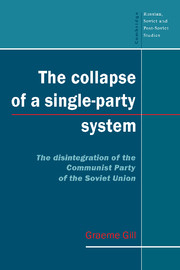2 - The personnel solution
Published online by Cambridge University Press: 12 May 2010
Summary
At the time of the election of Mikhail Gorbachev as General Secretary of the Central Committee on 11 March 1985, many of the problems which were to stimulate the drive for change were already evident to observers of the Soviet scene. The slowdown in economic growth that had been under way for some time was becoming particularly acute. The postponement of important investment decisions under Brezhnev, and the consequent need for large-scale re-investment in and re-equipment of productive capacity, was exacerbated by the need to shift to more expensive sources of power and to move towards an intensive style of development instead of the extensive style which had prevailed when labour supplies in the industrial regions were plentiful. A social malaise was also evident, reflected in declining health levels and the growth of such social diseases as alcoholism, marriage breakdown, youth alienation, poverty and corruption. In the policy sphere, a sense of drift had prevailed, fuelled but not caused by the succession of national leaders between 1982 and 1985. In the domestic realm, therefore, the need for policy initiatives was clear. Similarly, internationally, the relationship with the West had run into a dead-end and the Afghan war showed no signs of an early successful resolution. But these problems, serious as they were, were part of a subterranean foundation upon which the forms of Soviet politics were played out with little apparent direct effect of the former upon the latter.
- Type
- Chapter
- Information
- The Collapse of a Single-Party SystemThe Disintegration of the Communist Party of the Soviet Union, pp. 13 - 32Publisher: Cambridge University PressPrint publication year: 1994

